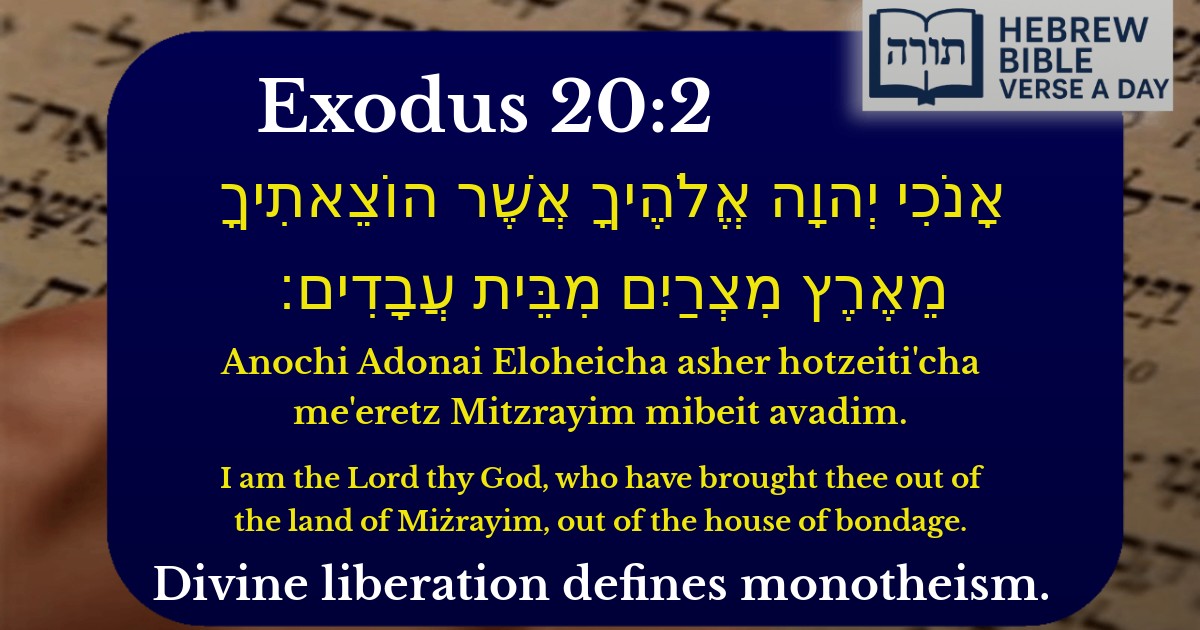Join Our Newsletter To Be Informed When New Videos Are Posted
Join the thousands of fellow Studends who rely on our videos to learn how to read the bible in Hebrew for free!
Hebrew Text
אָנֹכִי יְהוָה אֱלֹהֶיךָ אֲשֶׁר הוֹצֵאתִיךָ מֵאֶרֶץ מִצְרַיִם מִבֵּית עֲבָדִים׃
English Translation
I am the Lord thy God, who have brought thee out of the land of Miżrayim, out of the house of bondage.
Transliteration
Anochi Adonai Eloheicha asher hotzeiti'cha me'eretz Mitzrayim mibeit avadim.
Hebrew Leining Text
אָֽנֹכִ֖י֙ יְהֹוָ֣ה אֱלֹהֶ֑֔יךָ אֲשֶׁ֧ר הוֹצֵאתִ֛יךָ מֵאֶ֥רֶץ מִצְרַ֖יִם מִבֵּ֣֥ית עֲבָדִ֑͏ֽים׃
אָֽנֹכִ֖י֙ יְהֹוָ֣ה אֱלֹהֶ֑֔יךָ אֲשֶׁ֧ר הוֹצֵאתִ֛יךָ מֵאֶ֥רֶץ מִצְרַ֖יִם מִבֵּ֣֥ית עֲבָדִ֑͏ֽים׃
🎵 Listen to leining
Parasha Commentary
📚 Talmud Citations
This verse is quoted in the Talmud.
📖 Berakhot 12b
The verse is discussed in the context of the recitation of the Shema and the importance of remembering the Exodus from Egypt.
📖 Makkot 23b
The verse is referenced in a discussion about the commandments and their divine origin.
📖 Sanhedrin 56b
The verse is cited in the context of the Noahide laws and the recognition of God's sovereignty.


The First Commandment: Foundation of Faith
The verse "אָנֹכִי יְהוָה אֱלֹהֶיךָ אֲשֶׁר הוֹצֵאתִיךָ מֵאֶרֶץ מִצְרַיִם מִבֵּית עֲבָדִים" (I am the Lord thy God, who have brought thee out of the land of Egypt, out of the house of bondage) is the opening of the Ten Commandments (Shemot 20:2). It establishes the foundational principle of Jewish belief—the existence and sovereignty of Hashem.
Rashi's Explanation
Rashi comments that this verse serves as a commandment to believe in Hashem, as He identifies Himself as the One who redeemed Israel from Egypt. The phrase "אָנֹכִי יְהוָה אֱלֹהֶיךָ" (I am the Lord thy God) implies a direct, personal relationship between Hashem and each Jew. Rashi further explains that mentioning the Exodus reinforces this belief, as the miracles of Yetziat Mitzrayim (the Exodus) were witnessed by the entire nation, providing indisputable evidence of Hashem's power and providence.
Rambam's Perspective
In Sefer HaMitzvot (Positive Commandment 1), the Rambam (Maimonides) lists this verse as the source for the mitzvah to know and believe in Hashem. He emphasizes that this knowledge is not merely intellectual but requires internalizing the truth of Hashem's existence and His role as Creator and Sustainer of the world. The Exodus serves as a tangible demonstration of His involvement in human history.
Midrashic Insights
The Mechilta (a halachic Midrash on Shemot) teaches that this declaration was given in the singular form ("אֱלֹהֶיךָ"—"thy God") to emphasize that each individual must accept Hashem's sovereignty personally. Additionally, the Midrash highlights that the Exodus was not just a physical liberation but a spiritual one, freeing Bnei Yisrael from the idolatrous influences of Egypt.
Why Mention the Exodus?
Halachic Implications
The Sefer HaChinuch (Mitzvah 25) explains that this mitzvah obligates every Jew to affirm Hashem's existence and recognize His role in their lives. Denial of this principle is considered heresy (apikorsut) according to Jewish law. The Exodus serves as the cornerstone for this belief, as it demonstrates Hashem's control over nature and history.